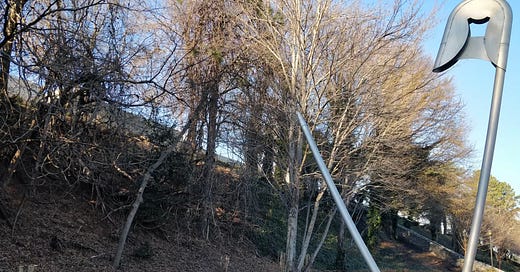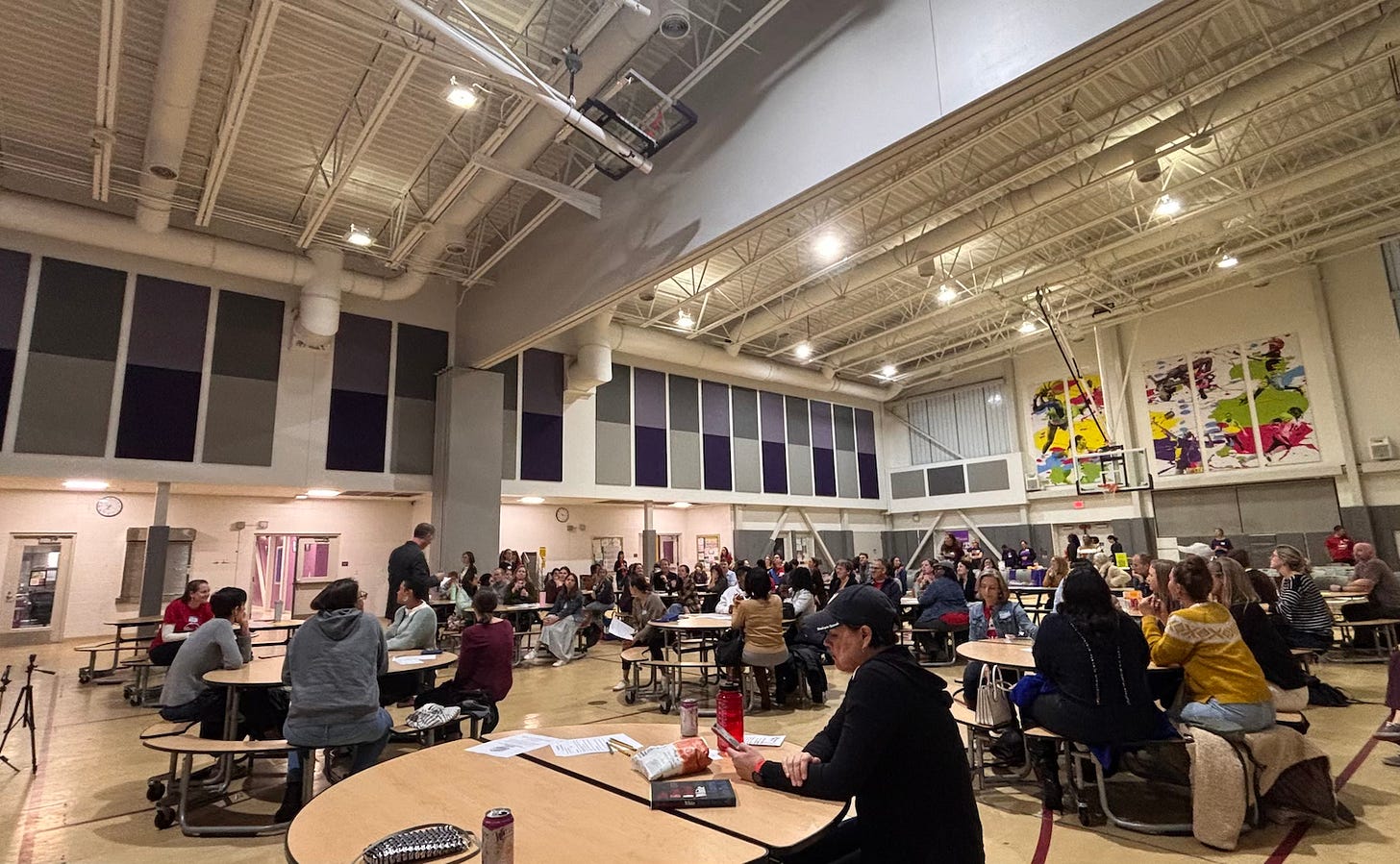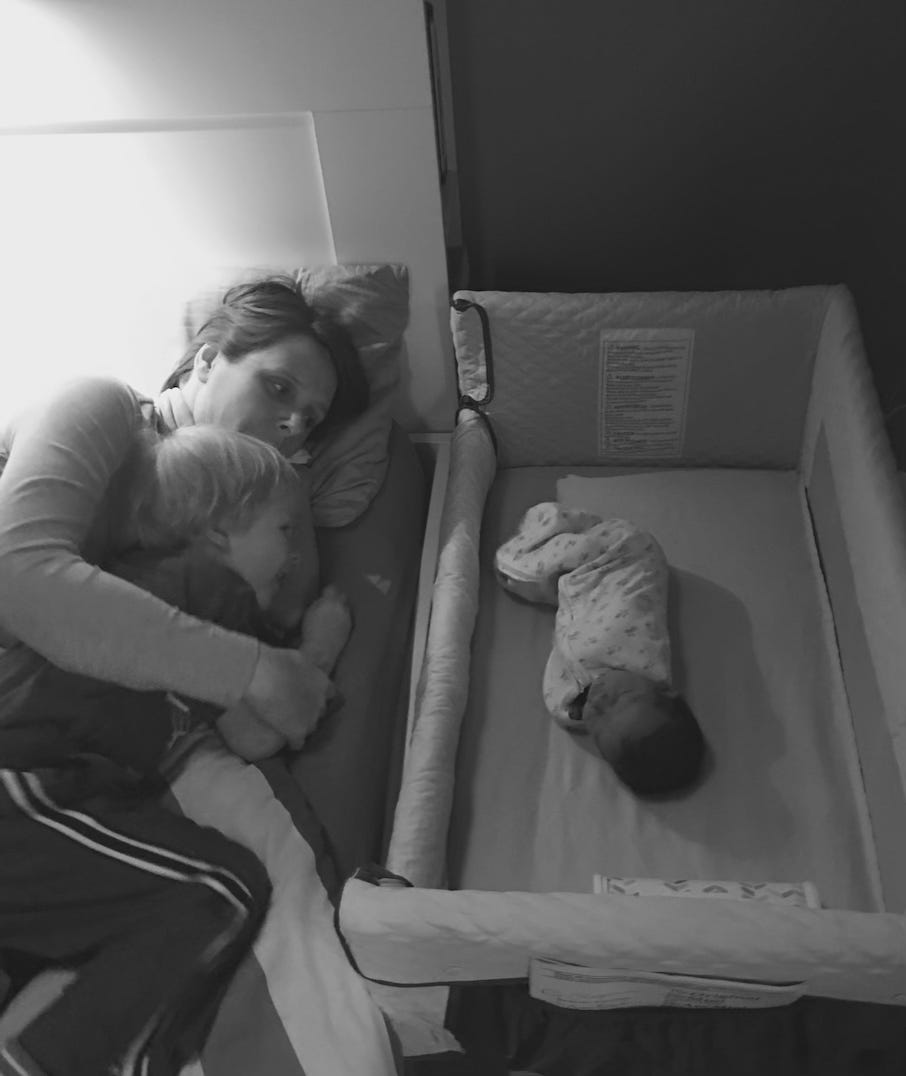The alert went off on my phone right before I was supposed to address a room full of parents
On safety, fear and each other
This time eight years ago, my wife was eight months pregnant. Our daughter can now read and write and score soccer goals and ask questions like “who was President when I was born?” Eight years from now, she’ll be old enough to drive. Eight years is a long time. Eight years is a lifetime.
But is it? I don’t know anymore. Eight years ago feels like yesterday, but not because of a lack of momentous events in the intervening years. There has been too much of everything. Wars and plagues and lessons learned and lessons forgotten. The fall of 2016 must have been yesterday, because otherwise what excuse do we have for how little we have to show for ourselves. The same person who was running for President then is still running now. Eight years ago, he was widely derided for chanting ‘BUILD THE WALL.” Now his opponent is bragging that she, too, will build a wall. He’s moved on to “MASS DEPORTIONS NOW.” Polls show that’s a winning message. Bi-partisan even.
Back to eight years ago, though. Do you remember the safety pins?
Eight years ago, shortly after Trump was elected, my people—earnest White liberals with college degrees and a propensity to place ourselves at the center of history—started wearing tiny safety pins on our shirts. In our defense, everything felt very intense and we told ourselves that there wasn’t enough time for second guessing. Those were not the golden days of sober consideration and proactive planning.
The idea, as far as I remember it, was that the safety pins were meant as a bat signal to Black and Brown people, immigrants in particular. I AM ONE OF THE GOOD ONES, we shouted in the supposedly universal language of accessorization. YOU CAN TRUST ME. I HAVE AFFIXED SOMETHING SMALL AND METAL TO MY SWEATER.
Not to belabor a decades-old micro-trend, but there are so many layers here, aren’t there? Before affixing a safety pin to our clothing, we had to make a number of logical jumps, including but not limited to the following:
There was a time, two months ago, when Black and Brown people used to think all White people were safe, but now they don’t anymore, because some of those White people voted for Trump.
Those once safe Black and Brown people are now surveying their nearest assortment of White people wondering “which ones will are my port in the storm from the malevolent White people about which I have just become aware?”
It is important that those Black and Brown people are assured of my goodness. Not for my sake, mind you. Not because of my own insecurities.
This moment demands bold, decisive, and dare-I-say-it sartorial action. Fortunately I own a safety pin.
If I’m remembering correctly, the backlash to the safety pins began immediately. This is, in retrospect, unsurprising.
I remember the day I put on a safety pin. I didn’t think much of it. I was about to walk into a training I was running for teachers, many of whom were immigrants themselves, some of them DACA recipients. I was exhausted. I was bewildered. I had been staying up late scrolling. Another earnest White person handed me a safety pin and I put it on. It wasn’t complicated. It neither saved nor ruined the day.
By the next week, I was already mocking all the safety pin wearers. I did not acknowledge that I had recently wore one myself. I had probably read some article somewhere. That article was likely quite persuasive. More so, it probably made me feel embarrassed and, as such, I hoped that if I too mocked and critiqued, I could pass that embarrassment off on somebody else.
The safety pins were silly. They didn’t accomplish anything. They most definitely revealed something about those of us who, even for a day, thought that they might be a good idea. But the same could be true, I suppose, for all the critiques, particularly the ones we White people lobbed at each other. I’M MORE TRUSTWORTHY THAN THEM, the think pieces shouted. THEY ARE SELF-AGGRANDIZING AND EARNEST, WHEREAS I AM SELF-AGGRANDIZING AND CYNICAL. THERE’S A DIFFERENCE.
I’ve been thinking recently about this desire to be trusted, particularly among those of us whose identities exist at the top of societal hierarchies. I’ve been thinking about “not all men” and about how Trump voters absolutely hate being called racist for their choice of candidates. I’ve been thinking about all the spaces I’ve been in with other White liberals and leftists where the secret handshake has been our ability to gossip about another group of people whose racism is presumably much worse than ours. Sometimes that group is the Trumpers, but usually its other White progressives, whose hypocrisies are closer to home and therefore easier to excoriate.
I’ve been thinking about orders of operation, about the jump to how we are perceived by others before we ask what others actually might need.
Last week I was on a panel at my niece’s elementary school in Washington D.C. The topic was “Building Community in a Multi-Racial School.” It was a well-organized event that attracted a big crowd for a fall Thursday. And no wonder. Washington D.C. is, like most American cities, the kind of place where “building community” is a fraught proposition. It is a place that was once working class and Black but is now much less so. It is a place where wealthier parents, especially White parents, commit to the public school system as long as they can be assured access to a handful of coveted schools, but whose commitment frays when they don’t. It is a place where neighborhoods have transformed and are still transforming, where people have been and will continue to be pushed out of their homes.
The crowd gathered last Thursday was heavier on moms than dads. It was largely Black and White, though weighted more towards the latter rather than the former. Was that a good sign, because it indicated the number of White parents (or at least White moms) taking this seriously? Or was the overrepresentation of White people a sign that Black families didn’t trust spaces such as this? And what about class? Do spaces like this work for working class families or not? Important questions, all of them. They’re questions about who feels welcomed and who doesn’t. But also, what a gift that all those parents gathered that night. What a gift that “community” was the agenda item that brought them in.
Shortly before I was supposed to go up on stage, my phone beeped and blurped in a way it never had before. I stole a quick glance and immediately went ashen. Back in Milwaukee, my sixth grade son’s phone had detected a crash. 911 had been dispatched. And I, in turn, was alerted. The message included a map with a pin on it, but no other details. I sent off a few frantic texts, but didn’t receive any replies before I had to go up on stage.
Thinking quickly, I had to decide how to triage the situation. Should I bail on the event and immediately find the quickest way back to Milwaukee? Should I wait for more information before jumping to conclusions? I split the difference, deciding to leave my ringer on while I was on stage. If any of the worst case scenarios running through my head were true, I’d get a call, and I’d excuse myself. Until then, I told myself half-convincingly, I’d act as if this were a false alarm. Like so many other moments in parenthood, I was stuck in purgatory—pummeled with worry, but largely powerless to convert that worry into efficacious action.
For obvious reasons, I have no idea what I said on the panel. I hope it was helpful and articulate, though I forgive myself if it wasn’t. I must have taken a few breaths here and there, but it sure as hell didn’t feel like it. What I do know, though, that as soon as the crowd was directed to engage in table discussions, I immediately checked my phone.
Holy crap it was nothing. Holy crap he was all right. Why the hell, Apple Corporation, is your crash detection software so sensitive that it was triggered by my son tossing his backpack down on the ground as he sprinted towards soccer practice?
Oh my God my son was safe. Everybody was. Him, my wife, his younger sister. Safe.
There’s a refrain you hear a lot at events like that panel, about how “every parent wants what’s best for their kids.” I’m pretty sure that in the midst of my mini fugue state, I said those words up on stage, though with a caveat about how the terrain we have to navigate as parents differs based on race, class and gender.
I have said those words plenty of times, but I have never said them shortly before staring out at a cafeteria full of other parents immediately finding out that my family, whose safety I feared just five minutes previously, are just fine. There was part of me that wanted to jump on the microphone again to shout “I just need to tell you all what just happened to me, because if anybody understands what I’m feeling right now , it’s you all, a room full of parents, a room full of people who once brought impossibly tiny babies home from the hospitals and wondered ‘so this is what it feels like for your heart to burst?’”
I didn’t take the microphone. Instead, I just enjoyed watching all the animated table discussions. I enjoyed talking to my co-panelist. I enjoyed all the follow up conversations with parents afterwards. I enjoyed knowing that even though I did not understand everything that went into these other parents feeling safe, I knew that they would understand the two waves of emotion I had just experienced. We had that, at least.
I don’t pretend that I was a source of safety and trust for the vast majority of people in that room. How could I have been. I was just getting to know them. I didn’t know any of them to know what alert on their phone would make them turn ashen. I didn’t know which of their loved ones demand a disproportionate amount of their attention and worry. I didn’t know all the ways that spaces have welcomed them or betrayed them in the past. I didn’t know that about them, and they didn’t know that about me.
Most of the parents in the room that night were strangers to each other, but not all. The fourth grade parents were different, though. They presented as a group. When shouted out from the stage, they hooted and hollered. They were Black and White, from a variety of class backgrounds. But they had been gathering together all fall. Nothing fancy. Just social events. Pizza parties and the like, ones they organized together. They are still feeling each other out, but I could tell that they were proud to be building a “we” together. They were starting to know each others stories. They were starting to learn what each other needed to be welcome. They were starting to care about each other’s sense of safety. They knew they were just starting, so they kept showing up. Had one of their phone alerts gone off, I imagine that they wouldn’t have to rush to the door alone.
Eight years ago, some of us wore safety pins on our shirts. It was silly, but we convinced ourselves that we didn’t know what else to do given the circumstance. But maybe that’s not true. Maybe we did know what to do, we just didn’t have the patience for it. Maybe we always know what to do, but it’s hard to do it alone. Maybe, eight years later, it’s not too late, because we are still surrounded by a potential community, and just because we don’t trust each other yet doesn’t mean that, with time, we might become one another’s source of safety.
End notes:
I know that your inbox is full of requests for your money, so I don’t take my own solicitous messages lightly. One thing I’ve learned about community, though, is that it requires both showing up for people and letting them know how to show up for you. In my case, if you appreciate these emails, the best way to return that favor is to chip in a few bucks to keep this space running. In return, I commit to making our subscribers’ spaces a welcome part of your week. Thanks for considering (and if you can’t afford a subscription, know that sharing also helps a bunch).
Speaking of community needs, there is some really cool organizing happening in Western North Carolina right now, and they are actively welcoming folks to join in with them. Yes, there’s an electoral focus, but it’s also being connected with post-Helene door-knocking to get a census of community needs. Here’s the update, via Showing Up For Racial Justice:
All in for Asheville: Block MAGA and Back the Recovery post-Hurricane
The past few weeks, Buncombe County has been reeling from the impact of Hurricane Helene. SURJ is now doing innovative and powerful door-knocking that combines "care checks" at the door, connecting people with local resources available, and conversations about the upcoming election. NC could very well decide the outcome of the Presidential election. And based on the last 15 years of voter trends, Buncombe County, home of Democratic stronghold Asheville, has the potential to tip the scales of the whole state.
NOTE: If you are local (within driving distance, and not staying overnight with us), please sign up using this link: https://www.mobilize.us/surj/event/731892/?utm_source=2024wmrecruitment
Next Monday is the last Barnraisers Project fall class. They’ve been a blast and I think you’ll enjoy them. More details here, and registration here.
Want to hear more reflections about this whole “focusing on community rather than just proving that you’re not like all those other White people” thing? I wrote a whole book about it. It’s called The Right Kind of White and I think you’ll enjoy it as well.
Because I was on the road last week through the beginning of this week, my publication schedule is all off (meaning, I don’t normally send this email on Wednesday evenings). What does that mean for the subscribers’ top five list/discussion this week? I haven’t decided! Gonna play that by ear.
As for song of the week, have you ever heard Prisoners by John Denver? I think it’s about how much we crave one another. When that baby was born eight years ago, I sang a lot of John Denver as I rocked her to sleep.
The full Song of the Week playlist is available on both Apple Music and Spotify.








Thank you! I made the mistake of listening to some depressing news last night, and I started spiraling a little. This writing helps!
Your description of the safety bin logic chain made me laugh out loud, but I think it was missing something, which was the sense that we didn't know what kind of precipice the country was on—one of the big things that precipitated the safety pins (which were 100% silly) was the reports that hate crimes were increasing rapidly. So it wasn't just myopia about how people of color viewed white people (though it certainly WAS that), it was also from a fear (borne out by news reports) that things were getting worse, and were likely to keep getting worse.
I say this because I think we've kind of memory-holed the national popular mobilization against Trump, and while some of it was regrettable (like the safety pins) some of it was really effective (like the spontaneous protests against the Muslim bans at airports). I know I'm not telling you anything you don't know already, as the coiner of the phrase "never apologize for the times you cared a little bit more") but I think there's a bit of nuance here to add. Again, not as a safety pin apologist!